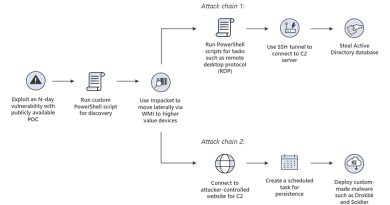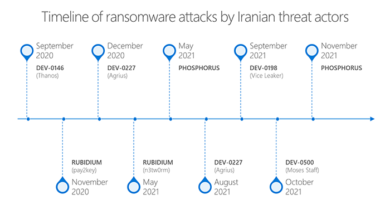How one product manager builds community at Microsoft Security

I first met Joey Cruz not long after he joined the Microsoft Identity and Network Access (IDNA) team when he helped create demos for a keynote speech I was delivering. Joey has a way of making you feel that even if something goes sideways, it will all be okay because he will make sure it is. As someone who has pushed through adversity from a very young age, Joey has channeled his resilience into an amazing career trajectory. He was recently promoted to Principal Product Manager at Microsoft.
What I love about Joey is his kind and helpful spirit. He tells a story that his mom once asked him why he didn’t do something. “It would literally take you two minutes,” she said. Ever since then, whenever someone reaches out for assistance, he responds as quickly as he can. His supportive nature is one reason he’s become such a valued member of our team and of the employee resource groups he helps lead.
Joey’s interview with Sue Bohn, Vice President of the Customer and Partner Experience Team in Microsoft IDNA, has been edited for clarity and length. We’ve included three video snippets so you can hear Joey talk about what drives and inspires him.
Sue: Joey, why don’t we just start at the beginning? Tell me a little bit about your childhood. I think you once called it a humble beginning.
Joey: That’s true. It was. I was born and raised in Houston, Texas. My mom came from Nicaragua to escape the civil war in the 1980s. When I was five years old, my dad went to prison, where he later passed away right before my first deployment to Afghanistan. It was just me and my mom and my two older sisters. I didn’t have a male role model, so my mom was always the person I would lean on.
I wanted to contribute, so at age 11 or 12, I picked up cash jobs doing manual work like cutting grass. I’d get paid USD40 a day and give my mom half. Back in the day, I thought I was really making money! I hated the Texas heat, which was insane. But my family’s always been my priority.
Sue: So, when did you first do something with computers?
Joey: I remember playing Oregon Trail at a computer lab in elementary or middle school. One of the most exciting things for me was to pop in that three-and-a-half-inch floppy disk, log in, and play video games.
When I was 16, I saved up money to lease my first computer. We couldn’t afford to pay it all off, so it was rent to own. I was so proud of it! When I got it home, I found out it wasn’t internet-capable. I had to buy a network card, take the computer apart, and plug it in. But that’s when I fell in love with the computer.
Then, of course, I was introduced to my first virus.
Sue: Your first virus—clearly there’s a story there!
Joey: It all started because I wanted to download files off the internet, which seemed like a great idea. I downloaded a file and then my mouse started moving by itself. I started freaking out. “What’s happening?” The only thing I could figure out to do was unplug the telephone wire. Ever since then, I wanted to understand exactly what happened. Now I know it was a remote access Trojan. Somebody had complete access to my computer. I hated that feeling of being used. That really enticed me to pursue a career in security.
Sue: I’m with you on that! So, you’ve got a computer. You’re cutting grass to pay for it. And at some point, you went into the military.
Joey: Yes. In Texas, everywhere you’d go, there was a sign that said, “Semper Fi.” It looked like Spanish, “Siempre.” Someone finally told me it’s the Marine Corps and means “Always Faithful.” Every Marine I met had so much confidence. And I was like, “What is it about the Marines that they’re so different?”
I learned they have the hardest basic training. I wanted to be part of that, the hardest thing to get into. So, I ended up leaving community college and enlisting. I was super nervous to tell my mom, but she supported me. And then right before my first deployment, I lost my dad.
Sue: That must have been really traumatic.
Joey: Yeah. My whole idea was to survive my first deployment, come back with medals, and then visit my dad in prison. If you’ve never been in a prison, it’s very emotional to see grown men in cages like animals. That’s why I’m terrified of getting in trouble. I wanted to show him that having my mom there made me into this man, but unfortunately, I never got the chance. It did teach me a life lesson, though. “Tomorrow is never promised, so enjoy today.”
I became a platoon Sergeant, managing almost 60 Marines. I was also the battalion martial arts instructor. I wanted to stay in the Marines for all 20 years, but I promised my mom that I would get out because it was so hard for her during my two deployments.
Sue: My father-in-law was in the Army and the National Guard, so I’m familiar with the rigor of the armed forces. It’s super cool that you came up through the Marines. How did you end up at Microsoft?
Joey: When you choose to get out, they put you through the “Transition Readiness Program.” They were telling us, “Hey, you could become a welder, a truck driver, a plumber.” But I wanted to work on computers.
Then I found out about the Microsoft Software System Academy. I was in the first group of Marines to go through 18 weeks of intense software development training. It was like a hardcore boot camp. I was the first Marine to get hired out of the program. That was in 2014.
The program has become super successful. It’s been launched across multiple military bases in the United States, and outside the United States as well. Microsoft has hired tons of Marines. And other companies have hired program graduates too.
Sue: We’ve hired several people into the Identity Customer and Partner Experience (CXP) Team, and they’ve been really rock solid. I think the experience you get from the military prepares you well.
Joey: What I loved most about the military was helping protect people. And I’m able to do that in my day-to-day work now, specifically by working with customers to help guide them to a safer state.
Sue: What does a day in the life of Joey Cruz look like?
Joey: A day in the life is to chat with our customers on how they can get into a more deployed state, specifically around identity. An example would be understanding identity protection, how to use those signals to identify risk, and how to use conditional access to remediate risk, such as blocking a bad actor.
Working with customers feels like the military. When I get assigned to a customer, I feel like I’m new to a new unit. It is crazy how close we become to these customers. It’s almost like we’re in the same platoon together, and our mission is to deploy Microsoft Azure Active Directory.
Sue: In addition to doing your regular job, you’ve been super active in driving a more diverse and inclusive culture at Microsoft. Tell us what you do there and why you do it.
Joey: I was fortunate enough to serve on the board of the Hispanic and Latinx Organization of Leaders in Action, known as HOLA. HOLA is an employee resource group that tries to help people feel like they have somewhere they belong and can lean on. It’s the same with Military at Microsoft, which I also helped with. It’s important to create these communities. Nobody wants to feel alone. Nobody. Working with these two groups actually inspired me to start my own nonprofit, called SOMOS.tech, which means “We are tech” in Spanish and Portuguese.
Sue: Wow. What does success look like for your startup?
Joey: Success is getting more Hispanic and Latinx folks hired into tech roles. Currently, we are only six percent of Microsoft employees. I made a lot of mistakes when I was trying to get into tech. Now that I have experience, I can show other people what helped me learn. I can mentor them, look at their resumes, and give personal referrals, which I do a lot of.
A lot of folks think of tech as developers. But there are entirely different disciplines, like product management, that require a different set of skills. That’s something that I hope to demystify within the community. And I want to reach out to the larger community to tell them that even if you come from humble beginnings, you can make it, too.
Sue: That’s a great message. We’re currently celebrating National Hispanic Heritage Month. What can we look forward to?
Joey: Every year from September 15 to October 15 is considered Hispanic Heritage Month. This is an opportunity to inspire by highlighting the contributions of Hispanic and Latinx members to our community, from the youngest woman to serve in the United States Congress, Alexandria Ocasio-Cortez, to musical artists like Bad Bunny, who comes from Puerto Rico and is one of the most streamed artists on Spotify. These stories are important to hear. And it’s also a time for us to highlight the differences in our community, such as our differences in music and dance.
Sue: Role models give people a chance to say, “Maybe I could be one of those people someday.” So, what advice would you give to someone considering a career in computers or security?
Joey: Start your own projects to get even more invested and gain experience. I would also say don’t be afraid of applying. I constantly see folks not wanting to apply because they think they don’t meet the qualifications. I would say the qualifications are a guideline. At Microsoft, we’re always looking for a learn-it-all, not a know-it-all. If you don’t know the technology in-depth, it’s completely okay. Do not be afraid. If you’re hungry to learn, you’re going to make it.
Sue: That’s so true, Joey, because even if you know everything that’s true today, it’s going to change. There will be new technologies and new exploits. So, there’s always more to learn and explore and solve in the world, not only with computers but particularly in security.
Joey: Absolutely. And that’s actually one of my favorite parts of working in this organization at Microsoft. We’re at the bleeding edge of technology, where every day something new comes out. We’re able to solve a new problem. We’re able to take different problems that we thought were solved and think about them in a new way.
Learn more
Learn more about Microsoft identity and access management.
To learn more about Microsoft Security solutions, visit our website. Bookmark the Security blog to keep up with our expert coverage on security matters. Also, follow us at @MSFTSecurity for the latest news and updates on cybersecurity.
READ MORE HERE



